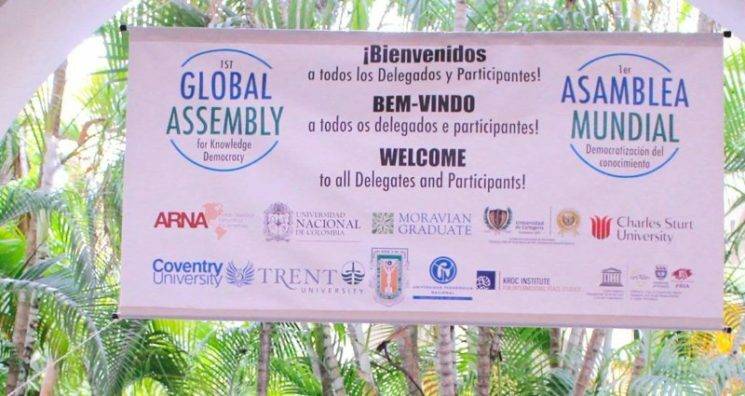Around six years ago my wife and I were beginning to have some serious conversations about our upcoming retirements from higher education including our evolving views of what we had accomplished as teachers and as scholars in education, where we had fallen short in our original goals and aspirations, and what we wanted to do for the after-retirement period. We each, at that time, had accumulated four decades of experience as teachers and professors in education. Our personal reflections were mixed with ongoing concerns about the slow pace of needed changes in education, the awkward and conflict-ridden relations between in-the-trenches K-12 educators and university researchers, the frequent confusion regarding what research was ‘proving’ about education reforms, curriculum development and the like, and the continuing marginalization of in-the-trenches practitioner input and knowledge creation regarding what works, how, when, where, and under what circumstances. It was for us a time of looking back as well as looking forward. Although happy in the awareness that we no longer would be tied to the formal infrastructures of higher education employment in the US, we knew that it was not our make ups to totally disengage from scholarly interests and the desire to contribute to improving society as engaged citizens.
It was in this context that Social Publishers Foundation (SPF) was created. A key determination in the Foundation’s vision was the importance of strengthening the position of practitioner research and practice-based research evidence (PBRE) in the varied sociopolitical-economic environments of policy-making in relation to the provision of basic human services. We wanted to establish a web-based presence which would foster greater awareness of the potential of people working as professionals, para-professionals, volunteers, and in-service trainees to produce knowledge in the varied yet civically interrelated domains of education, social work and social services, wellness and healthcare, and community-based participatory initiatives. We believed that fostering this greater awareness needed to be grounded from the start of the Foundation in the concrete efforts of people working in these fields to improve their practices, strengthen their communities, and bridge gaps between research and practice and between research and citizen efforts to improve the quality of life in communities.
We knew that the Foundation would need to concentrate initially on building a knowledge base that would demonstrate what our vision looks like in very practical terms. We also recognized that having a knowledge base, while a worthy contribution to thinking about and examining a variety of issues related to practices that we believe are crucial to healthy democratic societies, was not enough. We understood that the knowledge created through practitioner research likely would not make a significant dent, without a substantial count of published practitioner research, in the now dominant approaches to policy-making found at nearly all levels of official public decision-making, including local, state, regional, national and international contexts. We recognized that these dominant approaches would continue to over rely on outside expert knowledge and the over quantification of all aspects of service provision, outcomes, and impact. But we knew we would learn a great deal from the process of establishing the knowledge base and interacting with practitioner researchers, volunteer reviewers, and colleagues old and new who we recruited to provide input and guide us as we established the operational elements of SPF.
And that learning is what the last six years have been all about. After an initial stage of thinking and concept development and finding individuals with similar mind sets, we created the web-based non-profit publishing organization that you now are visiting. We now embark on a new phase for the Foundation’s work. The SPF Blog will be a place where issues of policy-making, practitioner research, research in general, and larger contexts of strengthening democratic societies will converge. Blog posts will draw on the SPF knowledge base and other sources to highlight the potential of practice-based research evidence to contribute to the search for creative solutions to the challenges of daily living in our troubled 21st Century. We will unpack assumptions regarding how best to determine what works in the domains of education, social work and social services, wellness and healthcare; we will look supportively and critically at the work of community-based participatory initiatives in relation to building healthy democratic communities and culture. SPF Blog posts are intended to be contributions to the larger dialogues associated with finding our way globally to new forms of sustainability and new ways of creating personal meaning and community engagements that help us all to live in peace and in harmony with the earth.

Dear Lonnie Rowell
THANK YOU SO MUCH FOR ALL YOUR CONTRIBUTIONS ON THIS ISSUE.
I WAS FORTUNATE TO BE WITH YOU ALL AT CARN CONFERENCE 2007 @SWEDEN AS A PRACTITIONER TEACHER…
THAT WAS A MARVELOUS EXPERIENCE.
THIS PLATFORM WILL LAY FOUNDATION FOR A GREATER SOCIAL CHANGE.
Happy to read the article from Lonnie and the comments from Chamani from Sri Lanka. Chamani is the first Sri Lankan teacher to present an action research paper in a foreign country. She presented an action research paper at the CARN conference in Sweden in 2007. All the best for your research involvement.
Dear Lonnie,
Thank you for your continuing work. Social Publishers Foundation has been an important platform where my graduate students have posted work, and where a vital organization has nurtured action and participation in constructing knowledge democracies in local schools and communities.
With gratitude, Rolla
Rolla E. Lewis, EdD, NCC
Professor Emeritus
California State University, East Bay
Taos Institute Associate
Looking forward to reading the posts!
Congrats for this space to share, I’ll recommend it to my students and colleagues.